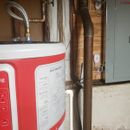Affordable or DIY drain water heat recovery on copper drain lines?
I have have been researching installing a drain water heat recovery but am finding a prebuilt one is expensive. A 4inch unit is available at home depot for $800. At that cost it seems it would take forever to payback. I am also using a Geospring HPHW for hot water and have solar panels that covers my full electric load. It only uses 2-4 kwhs a day on average.
I do have great potential to install one as my Geospring is located right next to my main 4 inch copper drain line coming from my shower and kitchen above. I would imagine the copper drain line would be excellent for heat transfer. The drain line gets pretty hot during showers. Incoming city water is around 50-55 degrees.
Has anyone made one by wrapping their own soft copper tubing around a copper drain line?
I attched a picture of my tank and drain line.
GBA Detail Library
A collection of one thousand construction details organized by climate and house part










Replies
I though about but even the cost of the copper pipe for that is not worth it.
You need to go with many small diameter pipes in parallel as anything larger than 1/4" will probably kink. You also need to get decent thermal contact so it is either solder (impossible without a big torch) or a thermally conductive epoxy.
You add all that up, you are probably still at a no reasonable ROI point.
DWHR makes sense if you are trying to stretch the capacity of your water heater, cost less to install than buying a larger tank.
In Ontario here where it is code required to install one in every new home, I had good luck finding one on Kijiji for $200. Saw some in the re-store for $300. I don't know where you are located, but you could try used?
Yupster,
Are there some caveats to the rule? If you are doing a slab on grade for instance - although I realize almost every house there has a basement.
I'm surprised Dougie hasn't repealed that requirement.
The trick to winding soft copper tubing into a relatively tight coil is to pack it (and you have to PACK it) with sand first. After you've packed the tubing tightly with fine sand, you can form it into tight coils without it kinking. When you're done, you need to vibrate or tap the tubing until all the sand runs out, then flush the last of the sand out with water.
Ideally you'd want to braze the tubing to the drain line, but soldering will be easier. The trick will be keeping the flux in place and not burning while you solder such a large assembly. I'd probably paint on some of the non-water based flux (since it holds up better with heat), then form the tube into the coil, then solder everything together with a MAPP gas torch. It would be tricky, but would be doable. Things to watch out for would be getting burned, which is easy when soldering something so large like this, keeping the coil tight to the drain pipe while working (maybe tie it in place with some stainless steel wire while working), and the inevitable cleanup of yourself afterwards since you'll get the flux all over your hands.
Certainly a doable project, but it's going to take a fair bit of time so consider the value of your time before deciding to build a DIY heat exchanger instead of just buying one.
Bill
If your solar panels cover your "full electric load" as you say, what benefit are you hoping to get from your drainwater heat recovery?
As an aside, there seems to be a lot of good discussion of the costs and savings of DWHR here: https://www.greenbuildingadvisor.com/article/toronto-passive-some-thoughts-on-drainwater-heat-recovery